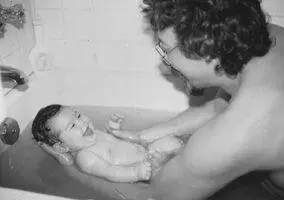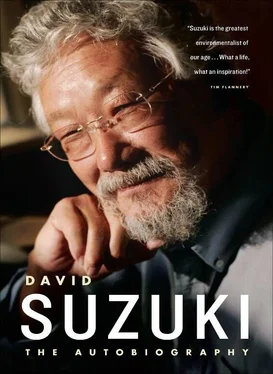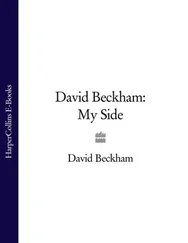One night we all played volleyball, and when we finished, we hung around outside, trying to delay going home so early. One of the young fellows drove up in his car and three or four giggling girls — including Tamiko — jumped onto his fenders and hood. The driver revved his engine a few times, then took off very quickly and jammed on the brakes after a hundred feet or so, causing the girls to slide off. They jumped back on the car, squealing, and he took off again. Everybody else seemed amused, but I was horrified. Suddenly I wasn't Dave, one of the gang. Now I became “David”—dad.
I had been running for years and was in pretty good shape, so I took off after the car and finally caught up to it when the driver stopped at a light. I yanked the door open, dragged him out of the car, and slammed him up against the side of the vehicle. “What the hell do you think you're doing?” I screamed, so pumped from fear I was almost hoarse.
I looked over and saw Tamiko staring in horror — I must have looked half crazed, and I knew she probably was humiliated to have her father behaving this way. “Get to your room!” I yelled, not caring any longer to be one of the gang. She looked away and disappeared down the street. Fortunately, I calmed down enough to restrain myself from slugging the boy. I was gratified the next morning when he came to me, apologized for his stupidity, and ended with, “You should have hit me. I deserved it.” Tamiko wouldn't look at me for days.
Six weeks is a long time. Not only did we pick up a good deal of French, we became a little community, despite the spread in ages. Although we were often referred to by our teachers as maudits anglais (“damned English”) or vous américaines (“you Americans”), we took it in good humor and grew quite fond of our young separatist teachers.
When it was announced that we would have a spectacle , or performance, at the end, we took it seriously. Tara and I wrote a drama around two individuals, one speaking only English, the other only French. All the rest of the characters spoke only in French. I played a Dr. Frankenstein character who decides he's going to try an experiment and sew these two, an anglophone and a francophone, together to see what will happen. We had lots of fun with the scene in which we got the two “volunteer” main characters operated on surgically behind a curtain and then revealed them joined together as Siamese twins.
At first as a unit they fought, pulling in different directions; then they yelled at each other. The yelling turned to blows. Finally they told the doctor it was intolerable and demanded to be cut apart. “But together you have more than the strength of two,” I said in French. “Apart, you may not even survive.” I know, I know, it was pretty ham-fisted, but we wanted our hosts and teachers to know that we valued the concept of a Canada that included Quebec and that Anglos also had a culture, spirit, and élan. At the end, we all sang “My Country Is a Cathedral” in English. Many people in the audience remarked later that they hadn't known English Canadians had that kind of spirit.
We had formed a close friendship with André and Louis-Edmond Gagné and their children, our hosts in Chicoutimi. They were rare for the Lac Saint-Jean/Chicoutimi area — outspoken opponents of separation and highly critical of the Parti Québécois. In 1979, the Gagnés came to Vancouver to visit us. We took them fishing, had them stay in our cottage at Sechelt, and showed them around English Canada. They spoke almost no English, and I was very proud to watch Vancouverites go out of their way to help and accommodate them. Twenty years later, when The Nature of Things did a program on bilingualism called “You Must Have Been a Bilingual Baby,” I arranged to interview the Gagnés in Chicoutimi. It was a happy meeting after so many years, but I was stunned and disappointed to learn the entire family had become staunch separatists.
DURING THEIR VISIT TO Vancouver, I had taken the Gagnés to the UBC Faculty Club. We were having a drink in the bar when Tara arrived, obviously upset about something. I took her aside as soon as I could and asked her what was wrong. She poleaxed me with her answer: “David, I'm pregnant.”

One of the great joys of parenthood, bathing Severn
It seemed as though we had made up our minds we wanted children and it simply happened, but I always think of an embryonic Severn struggling around that IUD, embedding herself in the lining of the uterus and hanging on for dear life. The IUD had to be removed, but the risk of miscarriage at this early stage was very high, and we worried about the amount of bleeding after it had been removed. But Sev was well embedded, and eight months later a wonderful gift arrived.
I had tried to devote as much time as I could to my first offspring, but the lab and research had dominated my life and the children had paid a price for this obsession with the end of my marriage to Joane and even beyond that. I was determined not to let that happen again. Research was not taking as much of my time as it did when I was younger and more ambitious, but now I was caught up in both television programming and activism on the environmental front.
Severn arrived to the great joy of my parents, who were retired. All of my sisters and their children lived out east, but now my folks could devote their full attention to this new baby. During Tara's pregnancy, we had begun renovations on our house so that Tara's mother and father could move in with us, and Severn was their first grandchild, so they were thrilled too.
As with my other children, we took Sev on camping trips from the time she was an infant, and she was soon catching fish in the ocean or freshwater lakes with my father, who was a fishing nut. From infancy, she accompanied us on Vancouver's annual Peace March as well as to protests against clear-cut logging.
We moved to Toronto the September after Severn was born, so that Tara could commute to Boston to teach expository writing at Harvard while a nanny and I cared for Sev and, later, Sarika. For five years after that, we relocated to Toronto each autumn so Tara could teach the fall semester; I would work on the new season of The Nature of Things . We'd move home to Vancouver at Christmas and stay there until the next fall.
We thought it was cute when Severn, at age five, gathered a group of children on the block in Toronto and decorated a wagon with signs saying things like Save Nature, and Protect the Animals. That summer, back in Vancouver, we found Sev had removed a number of hard-cover books from the house and had set up a table outside, where she was selling them for twenty-five cents apiece to raise money to help protect the Stein Valley. It was a noble cause, so we couldn't chastise her just because she didn't understand economics. I hope I managed to hide my annoyance.
When Severn was born, it had been sixteen years since the 1964 birth of my youngest child in my first family, Laura, so having Sev seemed like starting anew. When Sarika arrived three and a half years later, Sev was running and talking and entertaining us with her cleverness. Sarika was a placid baby — we even thought of calling her Serena — so we could put her down and she would gurgle away happily as Severn cavorted at the center of attention. As Sarika grew and started to talk, we would often call her “Little Me Too” because of her insistence that she not be ignored. It was hard when her sister was constantly attracting the limelight. Sarika was very shy, but she was fearless and always up for any family adventure.
Читать дальше



![David Jagusson - Devot & Anal [Hardcore BDSM]](/books/485905/david-jagusson-devot-anal-hardcore-bdsm-thumb.webp)









